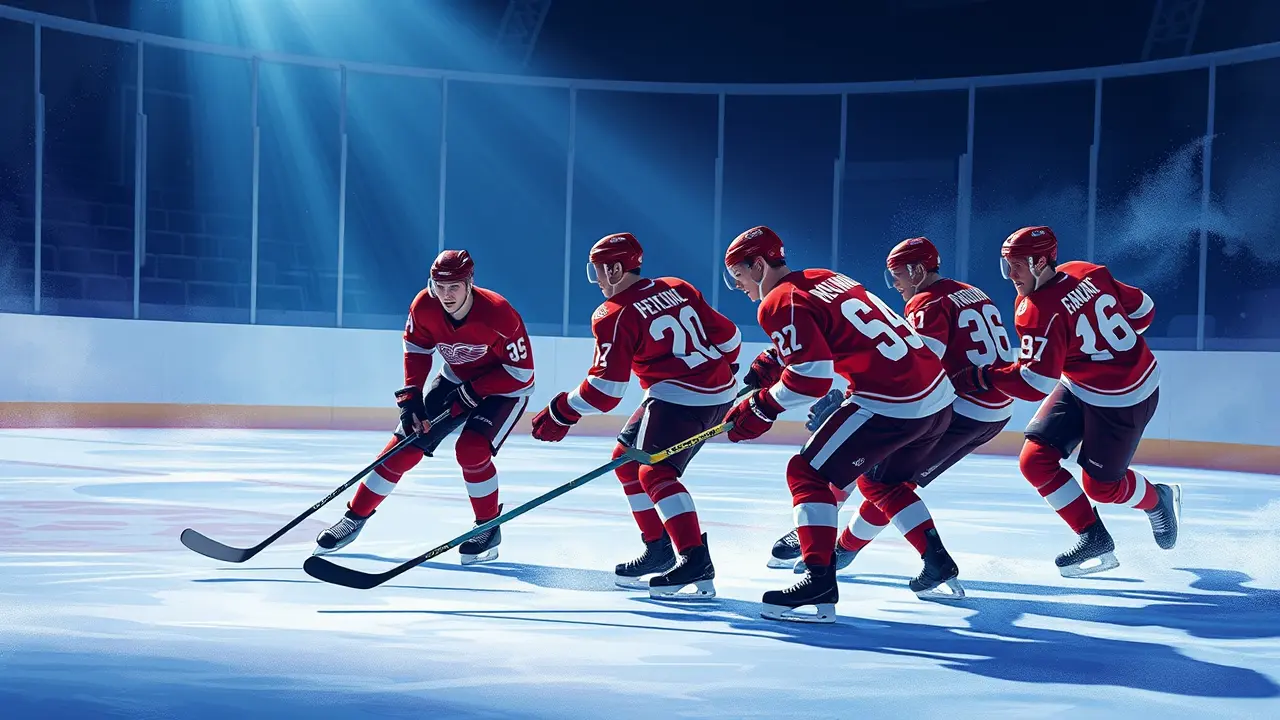
SporthockeyNHL
Larionov on Detroit's Russian Five: A Hockey Revolution
LI
Liam Brooks
6 days ago7 min read1 comments
Picture this: October 28, 1995, a date that should be etched into the mind of every hockey fan right next to the invention of the slapshot. The Detroit Red Wings, in a move that felt less like a coaching decision and more like a scene from a sports anime, iced five Russians at once for the first time in NHL history.The lineup was just absurd: defensemen Vyacheslav Fetisov and Vladimir Konstantinov, with forwards Sergei Fedorov, Igor Larionov, and Vyacheslav Kozlov rounding out the unit. It was the hockey equivalent of assembling the Avengers, a super-team that didn't just play the game but fundamentally rewrote its DNA.And the architect of this revolution, Igor Larionov himself, recently sat down to reflect on how this spontaneous experiment, born from his own frustrated request to be traded from the San Jose Sharks, became a cultural reset for the sport. 'What happened then was a revolution in hockey,' Larionov states, his words carrying the weight of a man who saw the future.'Those ideas are still used today. Absolutely.The creation of the ‘Russian Five’ set a new trend in the game that the viewers wanted to see, one that delivered a ton of emotions, and it introduced a new philosophy of play to the NHL. ' This wasn't just about winning, though they did plenty of that, famously capturing the Stanley Cup together in 1997.This was about artistry versus system, jazz improvisation against a classical score. The fundamental difference, as Larionov breaks it down, was in the mentality, preparation, and sheer quality of technique—a blend that created a kind of perfect harmony on the ice.'We understood each other without saying a word, without any problems or interference,' he explains, describing a level of chemistry that coaches dream of. 'We made it so that the play was born from the situation, not from a script.Essentially, we returned to the roots of what is called playing hockey. ' The origin story is almost too good to be true, the kind of behind-the-scenes drama that fuels NBA Twitter threads for weeks.Larionov, benched for ten days and having left the Sharks' camp, was told he wouldn't be moved before the trade deadline. The swap to Detroit caught him completely off guard.His first game with the Red Wings was in Calgary, and the legendary coach Scotty Bowman, a man who saw the game five or six moves ahead like a grandmaster, simply told the five Russians to take the ice together. There was no complex playbook, no rigid system to follow.Bowman’s instruction was brilliantly simple and utterly terrifying for any opponent: 'Play the way you know how. ' Larionov recalls the immediate intuition, that feeling in the locker room that they were about to lay a new foundation for hockey history.'It was clear thanks to Bowman's genius, who foresaw the situation five or six moves ahead,' he says, acknowledging the coach's role in unleashing their potential. This was more than a line change; it was a philosophical assault on the dump-and-chase, grind-it-out style that dominated the NHL, particularly in the post-original-six expansion era.The league had become bigger, tougher, and often less pretty, prioritizing physicality and defensive structure over the free-flowing, skill-based game that defined European hockey. The Russian Five were the antithesis of this.They played a possession-heavy, puck-control game built on short, crisp passes, constant movement without the puck, and an almost telepathic understanding of space. They didn't just beat you; they embarrassed you with a style that was both intellectually and aesthetically superior.It was the beautiful game, translated onto a sheet of ice. Fetisov, the stalwart defenseman, was the anchor, a veteran of the Soviet Red Army team who brought authority and experience.Konstantinov, 'The Vladinator,' provided the terrifying blend of sublime skill and brutal, physical enforcement—you couldn't take liberties with this group. Up front, Fedorov was the explosive, two-way force, a player with unmatched skating ability who could change the game in an instant.Kozlov was the silky-smooth sniper, and Larionov, 'The Professor,' was the cerebral quarterback, orchestrating the entire symphony from his center position. Their impact reverberated far beyond the Joe Louis Arena.They proved that skill could trump sheer brawn, that a collective brain trust could outperform individualistic effort. They paved the way for the influx of European talent that would follow, helping to globalize the league and elevate the overall quality of play.The modern NHL, with its emphasis on speed, skill, and transition play, owes a massive debt to the experiment Bowman conducted on that night in 1995. It legitimized a different way to win, demonstrating that system play could coexist with, and even be enhanced by, individual creativity and high-risk, high-reward offensive tactics.Of course, the story is also tinged with profound tragedy, which makes their peak all the more poignant. Just weeks after their 1997 Cup triumph, Vladimir Konstantinov's career was devastatingly cut short by a limousine accident that left him with severe, permanent injuries.The celebration was shattered, and the unit was never the same. This tragic end adds a layer of heartbreaking 'what if' to their legacy, a reminder of how fleeting sporting perfection can be.Yet, their influence is indelible. When you watch a team like the recent Tampa Bay Lightning or the Colorado Avalanche execute a flawless transition, or a unit cycle the puck with mesmerizing efficiency, you are seeing the echoes of the Russian Five.They didn't just win games; they changed the conversation. They made hockey more creative, more unpredictable, and ultimately, more beautiful.As Larionov, now at the helm of SKA, looks back, it's clear this was more than a successful sports story. It was a moment where the right players, with the right coach, at the right time, decided to play the game their way—and in doing so, changed it for everyone who came after.
#featured
#Detroit Red Wings
#Russian Five
#Igor Larionov
#hockey revolution
#Stanley Cup
#Scotty Bowman
Stay Informed. Act Smarter.
Get weekly highlights, major headlines, and expert insights — then put your knowledge to work in our live prediction markets.
Related News
© 2025 Outpoll Service LTD. All rights reserved.













